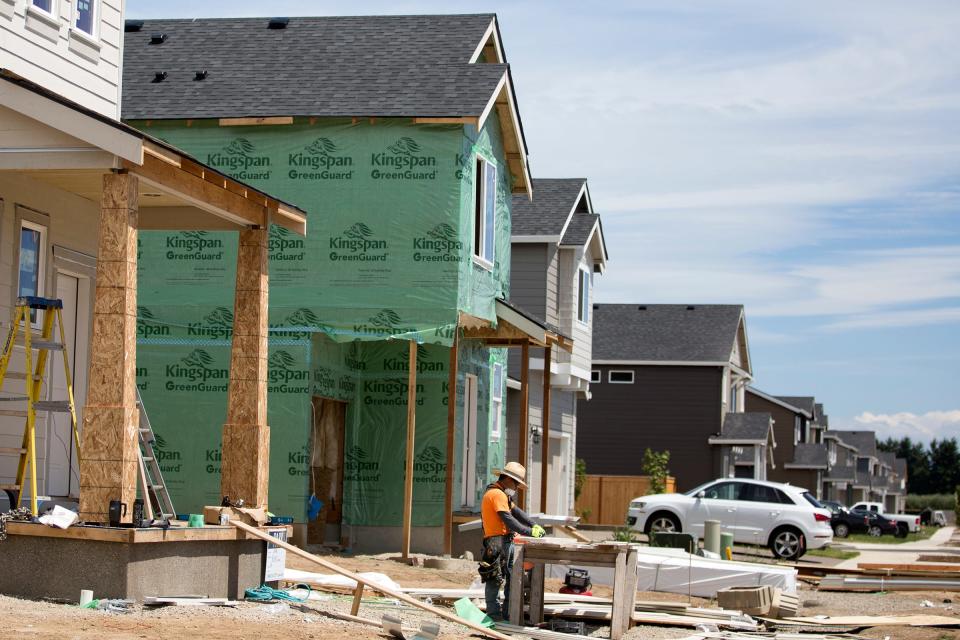Pesticide cleanup finished at 150-acre Northstar development
For three years, thousands of truckloads of pesticide-contaminated soil wound their way through Keizer neighborhoods, from a proposed development on Kale Street NE to a farm six miles away.
Now, an environmental cleanup of the 150-acre Northstar neighborhood is complete, the Oregon Department of Environmental Quality has determined.
Neighbors and government agencies raised alarms when developers proposed the project in 2017.
The soil was contaminated with dieldrin, a breakdown product of the insecticide aldrin, which was banned for crop use in 1970. It persists in soil for years and can accumulate up the food chain.
The contamination exceeded DEQ’s standard for residential areas, but was considered safe for farm use.
Opponents said the plan had the potential to spread contaminated dust from the trucks, which passed three schools on route to the farm. They also worried that once at the farm, where it would be used to fill two former quarry pits, it could contaminate groundwater and surface water.
In response, DEQ required the developer to use dust-control measures, and required the farmer to cover the contaminated soil with three feet of clean fill.
Nichole Tarter, a Neighborhood Watch leader who lives near the truck route, said concern died down after the project began.
The developer, I&E Construction in Wilsonville, asked the Statesman Journal to email questions about the project, but did not answer them.
“I think new neighbors are unaware and ones that have been here awhile aren’t as concerned now that the ‘dust’ has settled, literally,” Tarter said.
Cleanup and construction of the development, with 500 homes, plus duplexes and apartments, has been completed in phases. The site is at 4985 Kale St. NE.

The developer was allowed to begin building on the eastern portion of the property in 2018, after it excavated and temporarily stockpiled 55,000 cubic yards of contaminated soil on the western part of the site.
In 2019, development began on the western part of the site after another 47,000 cubic yards of contaminated soil was added to the stockpile.
DEQ allowed the developer to use about 25,000 cubic yards of soil with lower contamination levels from the western portion as structural fill in the area where apartments would be constructed.
It also allowed a higher level of contamination in the apartment area overall than in the area for homes.
DEQ’s cleanup goal for residential areas is 0.034 milligrams per kilogram, while the goal for urban residences is 0.085 mg/kg.
“Urban residents, such as apartment renters, have less exposed soil to come in contact with while single-family residential typically have larger yards leading to a larger exposure area to soil and also more time spent in the soil by adults and children,” DEQ spokesman Dylan Darling said. “More area of exposure leads to a larger risk.”
Developers asked for the change after discovering more contaminated soil than originally estimated, and facing limited space in the two quarry pits.
It saved between $260,000 and $350,000 in transport and disposal costs, and reduced the number of truckloads of contaminated soil traveling on Keizer streets by about 2,000, according to DEQ documents.
Darling said DEQ does not require the developer to inform people buying or renting in the development about the previous soil contamination.
In 2020 the developer finished cleanup of the central property, removing 51,585 cubic yards of contaminated soil.
The last portion, which contains a wetland and creek, will be donated to the city of Salem. The city plans to use the piece of land for a stormwater treatment facility.
"It involves a series of site grading, soil layering, and vegetation growth that helps filter water runoff through a natural process and absorbs, filters, and slows potential stormwater pollutants from the runoff generated by the homes and streets in the neighborhood before entering the creek system," said Trevor Smith, a spokesman for Salem's Public Works department.
The Northstar development land had been farmed since the 1890s. The late Salem developer Larry Epping’s company bought the property in 2005, and sold it to I&I Construction in July 2017.
Soil samples taken between August 2015 and June 2016 showed the presence of the pesticides DDT, DDD, DDE, aldrin, atrazine, chlorpyrifos, diuron and dieldrin. Only dieldrin exceeded health standards for residential use of the property.
Tracy Loew is a reporter at the Statesman Journal. She can be reached at tloew@statesmanjournal.com, 503-399-6779 or on Twitter at @Tracy_Loew.
This article originally appeared on Salem Statesman Journal: Pesticide cleanup finished at Salem housing, apartment development

